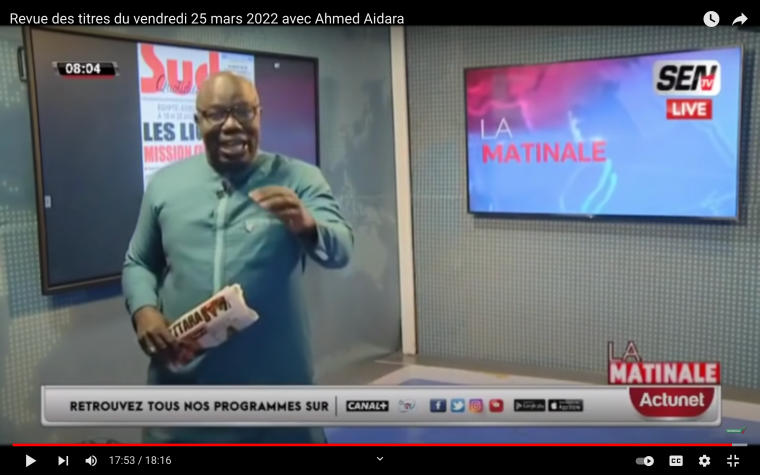On March 31, 2022, Senegal’s official broadcast media regulator, the National Council for Audiovisual Regulation (known by its French acronym, CNRA), announced a 72-hour suspension of all programing by local broadcasters ZIK FM and Sen TV for “repeated breaches of ethics” that violated “principles of objectivity, neutrality, fairness, and balance,” according to a press release published on the regulator’s website.
ZIK FM and Sen TV are subsidiaries of the private media group D-Média, which is owned by Bougane Guèye Dany, leader of the opposition coalition Gueum Sa Bopp.
The alleged violations took place during on-air segments by Ahmed Aïdara, a member of the opposition Yewwi Askan Wi (Liberate the People) coalition who was elected mayor of Guédiawaye, a suburb of Dakar, in January. During those segments, several of which CPJ reviewed, Aïdara provided commentary on daily news stories.
The broadcasters’ suspension was lifted after the three days. On April 5, 2022, Aïdara announced his resignation from D-Média and launched his own YouTube channel, where he broadcasts similar content. He is currently running to become a member of parliament in Senegal’s general elections in July, according to media reports.
Previously, on March 14, the CNRA had warned D-Média over the content of Aïdara’s program, according to a notice published on the regulator’s website. The CNRA claimed Aïdara had violated rules purportedly in place to promote objectivity by continuing to “promote himself and his political side and to denigrate the opposite side or citizens.”
In a March 31 interview with a local radio station, the executive director of the D-Média group, Moumy Seck Guèye, said the CNRA’s decision was “illegal” and that they would challenge the suspensions in court. “[Aïdara’s] political hat does not interest us,” Guèye added. “How many political journalists are there in the media? There is a double standard.”
Speaking to CPJ by phone, Ibrahima Bakhoum, CNRA’s communications officer, said, “When there is a recurrence [of an alleged violation], as in this case [with D-Média], we do not waste time.” The CNRA had warned journalists involved in politics that the press code and the Senegalese journalists’ charter prohibited conflicts of interest, said Bakhoum, adding, “One cannot be in politics and be in news production.”
CPJ called and sent text messages to Guèye for clarity on the organization’s plans to challenge the regulator’s decision, but she did not respond. CPJ contacted several Sen TV staff members for comment on the suspensions, but each of them said Guèye was the only person able to speak for the company on the issue.
CPJ’s calls and questions sent via messaging app to Aïdara went unanswered.
The regulator had previously imposed a 72-hour suspension on Sen TV and another privately owned television station, Walf TV, on March 4, 2021, according to local media reports. The suspensions related to the outlets broadcasting images of unrest following the arrest of the main opposition leader, Ousmane Sonko, according to the same sources.
In its decision to suspend Walf TV, the CNRA cited the station’s “repeatedly broadcasting images of violence.” CPJ was unable to review a copy of the regulator’s March 2021 decision to suspend Sen TV.
Both Sen TV and Walf TV managed to continue broadcasting via social media throughout that suspension period, according to CPJ’s review of their pages at the time.
In a recent phone interview, Moustapha Diop, director of Walf TV, told CPJ that the broadcaster only learned of the March 2021 suspension when its signal was cut, with the official notification not coming until the following day.
In response to CPJ’s emailed questions following the March 2021 suspensions, the CNRA requested an in-person meeting. CPJ responded that such a meeting was not possible, but the regulator never responded to the questions.
